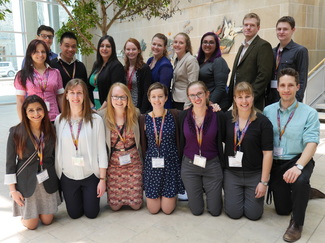 WatIF 2014 Graduate Student Committee: Comprised of 17 volunteer graduate students from varying disciplines at Queen's University, Canada
WatIF 2014 Graduate Student Committee: Comprised of 17 volunteer graduate students from varying disciplines at Queen's University, Canada I had the privilege of being a part of the planning team for the first WatIF conference in 2014. There was a great excitement in being a part of a team that was defining what WatIF would be for participating graduate students. At the time of the conference, I was in the third year of my undergraduate degree at Queen’s University. Similar to many students in their senior years, I was unclear as to what my next steps would be. I knew that I was interested in water and other environmental issues and so I decided to volunteer for WatIF. However, what I wasn’t expecting was that WatIF provided me with the inspiration and confidence I needed to pursue graduate studies and empowered me to apply for positions that I would have never considered would be achievable.
Working with my fellow committee members and participating in the conference gave me the self-assurance I needed to lead in a room full of intellectuals and understand my interests and motivations on a deeper level. I was pushed outside of my comfort zone, and was thus able to realize that there are so many opportunities for growth in water related endeavours that don’t necessarily follow the normal trajectory that undergraduate/graduate students follow. So I decided to apply for an internship at the United Nations, and set my sights on cities in Europe and Asia with regional or specialized offices. I applied for very general positions that specified work on ‘sustainable development’ and the ‘environment’. I eventually was offered the position at the United Nations ESCAP in Bangkok, Thailand where I helped research for a regional entry for the World Water Development Report 2016, which focused on the intersections of impact investment in improved water and sanitation and job creation in the Asia-Pacific region. Once I developed a strong relationship with my supervisor, she told me that my involvement with WatIF was a contributing factor that helped me secure the internship. I believe as researchers, we sometimes hit roadblocks and doubt ourselves, however, experiences such as this assured me that I was taking the necessary steps to achieve my overall goals.
Working with my fellow committee members and participating in the conference gave me the self-assurance I needed to lead in a room full of intellectuals and understand my interests and motivations on a deeper level. I was pushed outside of my comfort zone, and was thus able to realize that there are so many opportunities for growth in water related endeavours that don’t necessarily follow the normal trajectory that undergraduate/graduate students follow. So I decided to apply for an internship at the United Nations, and set my sights on cities in Europe and Asia with regional or specialized offices. I applied for very general positions that specified work on ‘sustainable development’ and the ‘environment’. I eventually was offered the position at the United Nations ESCAP in Bangkok, Thailand where I helped research for a regional entry for the World Water Development Report 2016, which focused on the intersections of impact investment in improved water and sanitation and job creation in the Asia-Pacific region. Once I developed a strong relationship with my supervisor, she told me that my involvement with WatIF was a contributing factor that helped me secure the internship. I believe as researchers, we sometimes hit roadblocks and doubt ourselves, however, experiences such as this assured me that I was taking the necessary steps to achieve my overall goals.
Living in Bangkok allowed me to see the issues that water researchers deal with on a fist-hand basis. The internship further drove my interest to take a detailed look at water issues and understand how young researchers such as myself can make tangible changes to the way policy and science operate. In Bangkok, there are large-scale issues involving water such as extreme weather events, pollution from agricultural and industrial outputs, and overfishing. Witnessing these problems while working at the UN gave me the same feelings that WatIF provided me – the motivation to make a difference through collaboration with likeminded individuals.
Living in a region with extremely pressing water issues changed my perspective on the management of the resources. A highlight for me was at the 71st Commission session where I had the opportunity to speak to world leaders and diplomats from Pacific small island states, who are among the most vulnerable to climate change. These small islands are comprised of coastal communities and increasing amounts of rainfall and tropical storms. In addition, there are higher population densities and growth rates coupled with outdated infrastructure and poverty. In Canada, we see water as a resource we need to conserve, and it was fascinating to learn about how roadmaps are being developed to assist these small island nations. The eye-opening aspect was that they see water as a resource that is vital and also as something which hinders their ability to survive for fears of natural disasters. This taught me the importance of knowledge sharing as Canada has such significant aquatic ecosystems and freshwater supplies, and through intergovernmental organizations, this information can be shared to create a stronger international front.
Living in a region with extremely pressing water issues changed my perspective on the management of the resources. A highlight for me was at the 71st Commission session where I had the opportunity to speak to world leaders and diplomats from Pacific small island states, who are among the most vulnerable to climate change. These small islands are comprised of coastal communities and increasing amounts of rainfall and tropical storms. In addition, there are higher population densities and growth rates coupled with outdated infrastructure and poverty. In Canada, we see water as a resource we need to conserve, and it was fascinating to learn about how roadmaps are being developed to assist these small island nations. The eye-opening aspect was that they see water as a resource that is vital and also as something which hinders their ability to survive for fears of natural disasters. This taught me the importance of knowledge sharing as Canada has such significant aquatic ecosystems and freshwater supplies, and through intergovernmental organizations, this information can be shared to create a stronger international front.
Volunteering to help organize WatIF 2014 was the training I needed to learn how to engage and network with my peers, professors, and industry leaders, a skill that students in academia rarely have a chance to develop outside of their own fields. The Co-Chairs of the conference did not shy away from entrusting me with responsibilities and making me feel a part of the success of the event, which gave me a sense of confidence in my own personal abilities. Although the conference was extremely impactful, my favourite aspect about my overall involvement stemmed from the meaningful relationships I formed with other students and participants. These connections are ones that I believe I will have throughout my career and friendships I will cherish for the rest of my life. When I was applying for my internship at the United Nations and completing my graduate studies applications, I felt as though I had mentors with me through every step. The lessons I took away from the entire experience made me feel more prepared for graduate school and future endeavours I partake in.
Participating in WatIF will make you a stronger leader because the conference is designed to build your skill sets and your confidence. It is an entirely student organized and operated event and so you really feel like a community of early leaders. This conference encouraged collaboration and partnership among students, industry leaders, and university faculty. More than other similar events I have attended, WatIF promotes unity amongst researchers through stressing the interdisciplinary nature of managing such a vital resource. We all spend a great deal of time in our offices and laboratories working on topics that deal with water, and platforms such as WatIF allow us to take a step back from our research and make the connections we need to implement our life’s work and empower us to take a leap forward and do things we would have never thought possible.
Participating in WatIF will make you a stronger leader because the conference is designed to build your skill sets and your confidence. It is an entirely student organized and operated event and so you really feel like a community of early leaders. This conference encouraged collaboration and partnership among students, industry leaders, and university faculty. More than other similar events I have attended, WatIF promotes unity amongst researchers through stressing the interdisciplinary nature of managing such a vital resource. We all spend a great deal of time in our offices and laboratories working on topics that deal with water, and platforms such as WatIF allow us to take a step back from our research and make the connections we need to implement our life’s work and empower us to take a leap forward and do things we would have never thought possible.
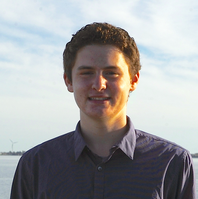
Joshua Goodfield is currently working towards completing a Masters of Applied Environmental Science and Management at Ryerson University. Joshua's research focuses on environmental and energy policy with an emphasis on life-cycle assessments, stakeholder relations, and sustainable development.
Author's Contact: joshuagoodfield[at]gmail[dot]com
Author's Contact: joshuagoodfield[at]gmail[dot]com

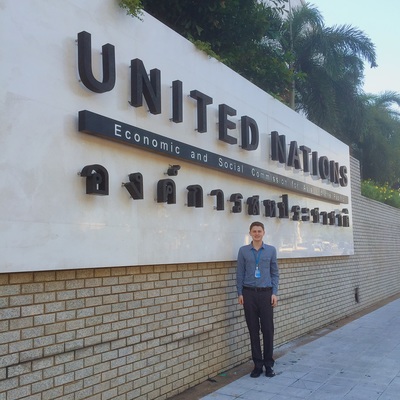
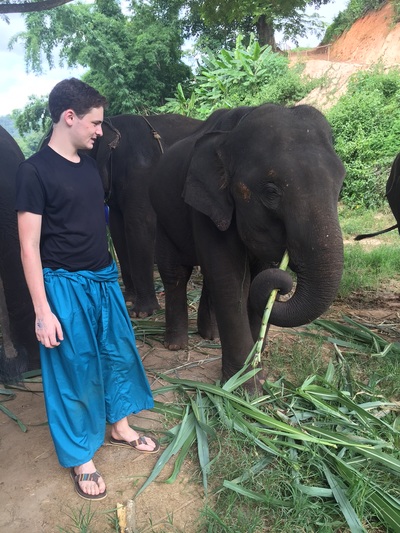
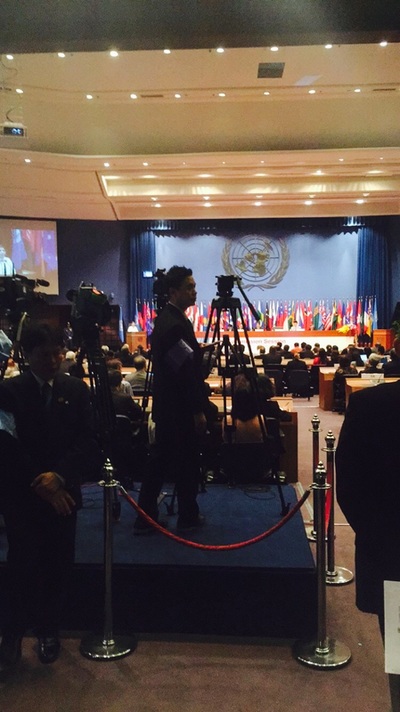
 RSS Feed
RSS Feed
